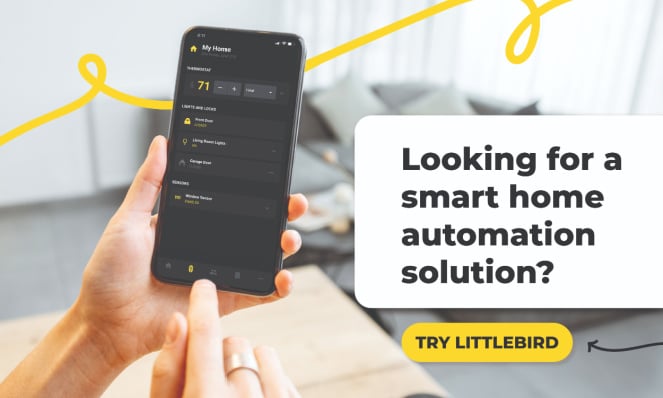What's the difference: Self-Monitored Security vs Traditional Home Security Systems
In an ever-changing world where safety and peace of mind are paramount, the concept of self-monitored security has emerged as a game-changer for residential communities.
With advancements in technology, residents now have the ability to actively monitor and manage their own security needs, thanks to innovative proptech solutions like LittleBird.
In this blog post, we delve into the fascinating realm of self-monitored security, exploring what it is and highlighting the benefits it brings to residents.
Navigate this article:
- What is Self-Monitored Security?
- What is the Difference Between Self Monitored Systems and Traditional Security Systems
- Benefits and Drawbacks of Self-Monitored Security
- LittleBird's Self-Monitored Solution
What is Self-Monitored Security?
Self-monitored security for apartments empowers residents with the ability to personally monitor and safeguard their living spaces.
This innovative system utilizes a range of smart devices, including security cameras, motion sensors, door/window sensors, and mobile applications, all seamlessly interconnected via the internet.
%20(1).jpg?width=500&height=264&name=shutterstock_2004138026%20(1)%20(1).jpg)
By accessing and controlling these devices remotely through smartphones or other mobile devices, residents can keep a watchful eye on their homes, receive real-time alerts, and take prompt action in response to any security-related events.
With self-monitored security, apartment residents can enjoy enhanced peace of mind and maintain a proactive approach to protecting their homes and loved ones.
What is the Difference Between Self-Monitored Systems and Traditional Security Systems
When comparing self-monitored security systems and traditional security systems typically found in single-family housing, there are notable differences that can impact the experience and preferences of apartment complex residents.
How Traditional Home Security Security Systems Work
Traditional home security systems are built to ensure a prompt and direct response when emergencies such as burglary or fire arise.
Here's how they typically operate:
- Alarm Triggering: When a sensor detects a potential threat, such as a break-in or fire, the alarm system is triggered. This can be a loud siren or a silent alert, depending on the system.
- Monitoring Center Notification: The alarm system immediately sends a signal to a monitoring center, which operates 24/7. Trained professionals at the monitoring center receive the alert and assess the situation.
- Dispatching Authorities: If the monitoring center determines that an emergency is occurring, they contact the appropriate authorities, such as the police or fire department. The authorities are then dispatched to the location to address the situation.
However, in the context of apartment complexes, the conventional approach of relying solely on professional monitoring may not always be the most suitable solution.
How Self-Monitored Security Systems Work
Self-monitored security systems, on the other hand, offer a more hands-on and flexible approach.
Instead of involving the police automatically, these systems send alerts and notifications directly to the resident's smartphone or other connected devices. This allows residents to assess the situation themselves and decide the appropriate course of action.
In apartment complexes, where residents live in close proximity to each other, self-monitored security systems are generally more desirable.
Not every resident would appreciate the police showing up at their front doorstep for every triggered alarm, which could potentially lead to unnecessary disruptions and concerns.
Self-monitoring allows residents to have control over their security system and respond accordingly, whether it's contacting the property management, checking the situation remotely, or alerting the authorities if necessary.
Interested in Self-Monitored Security?
Benefits and Drawbacks of Self-Monitoring Security
Self-monitored security systems offer several benefits and drawbacks that are important to consider when selecting a solution.
Benefits of Self-Monitored Security Systems:
- Cost-Effective: Self-monitored systems often have lower upfront costs.
- Flexibility and Control: With self-monitoring, you have control over how you respond to security alerts. You can decide whether to contact the authorities or handle the situation yourself.
- Remote Access: Many self-monitored systems provide remote access through mobile apps, allowing you to monitor and control your security system from anywhere, enhancing convenience and peace of mind.
- Customization: Self-monitored systems are often more customizable, allowing you to personalize the settings and notifications to suit your specific needs and preferences.
Drawbacks of Self-Monitored Security Systems:
- Reliance on User Response: Since the system relies on your response, there's a potential risk of not addressing security incidents promptly if you're not available or fail to notice the alerts in a timely manner.
Ultimately, the suitability of a self-monitored security system depends on your individual needs, preferences, and level of involvement in monitoring your property's security.
Take Control of Your Security with LittleBird's Self-Monitored Solution
LittleBird's proptech solution offers residents the benefits of self-monitored security, providing them with enhanced peace of mind and control over their residential community.

- Motion Sensors: Detect any movement within the property, alerting residents to activity with precision and reliability.
- Door and Window Contacts: Alert residents the moment an entry point is breached, providing immediate knowledge of perimeter security status.
- Smart Door Lock: Give residents the ability to secure their doors from anywhere, adding a layer of safety and convenience.
- Mobile App: The central hub for managing all aspects of the home’s security system, accessible from any location.
- Leak Detection Sensors: Offer early warnings for potential water leaks, preventing damage and giving residents time to react.
- Video Intercom: Enable residents to safely confirm the identity of visitors with one-way video calling, ensuring their privacy is maintained.
By combining these features into a single platform, LittleBird empowers residents with self-monitoring capabilities. They have greater control over their own security and can proactively respond to any potential threats or concerns. This self-monitored security not only enhances safety but also instills a sense of confidence and peace of mind among residents, fostering a secure and comfortable living environment within the residential community.
Final Thoughts…
By choosing self-monitored security systems in apartment complexes, residents can maintain a sense of privacy, avoid potential false alarms, and have more control over how security incidents are handled within their living environment.
This approach strikes a balance between maintaining security measures and respecting the preferences and comfort of apartment complex residents.

-1.png?width=5935&height=1114&name=NEW%20LU%20%E2%80%93%20Long%20Logo%20%E2%80%93%20Dark%20(1)-1.png)
Comments